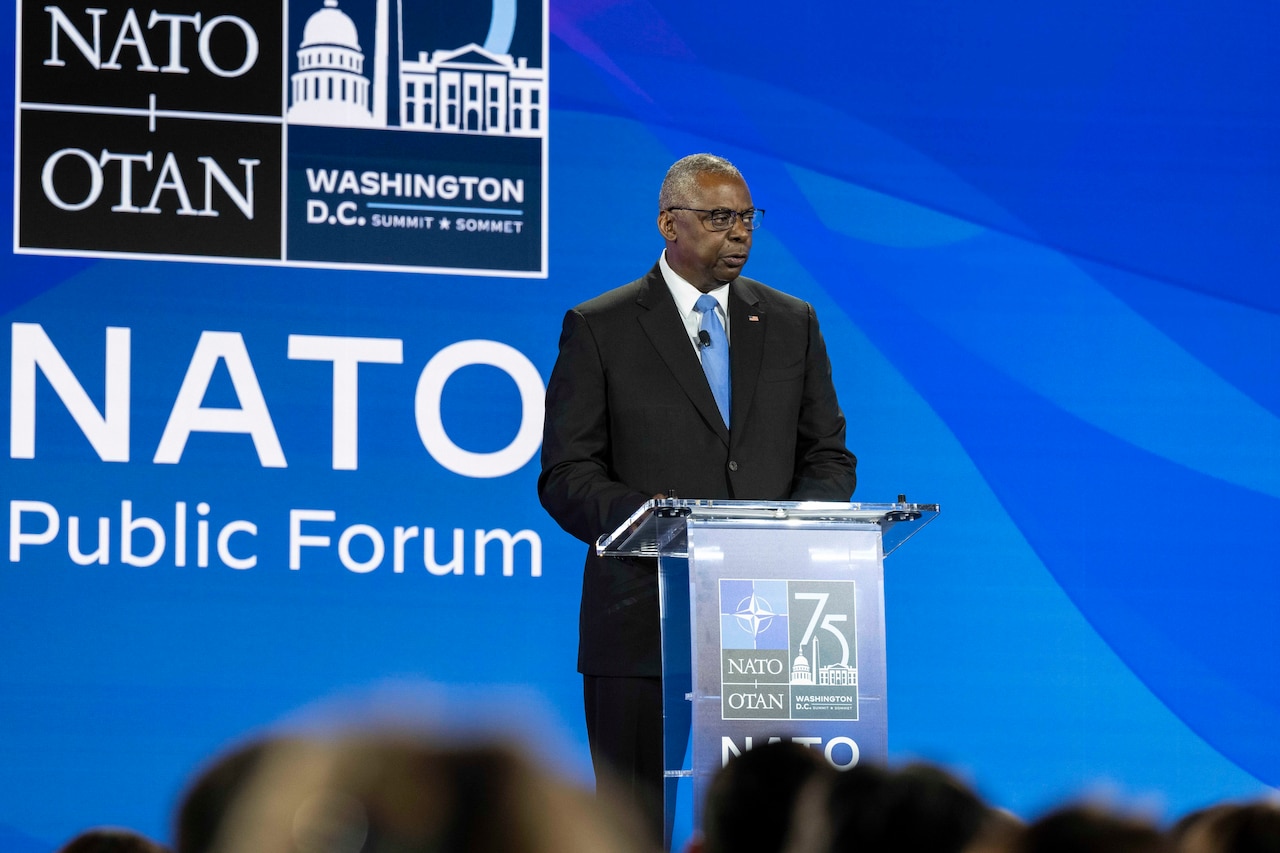The North Atlantic Treaty Organization was formed 75 years ago when the treaty that created the alliance was signed on April 4, 1949, in Washington. Just a dozen nations were signatories.
Since then, the NATO alliance has grown to include 32 nations. During a summit this week in Washington, NATO member states are commemorating the alliance’s longevity and growth.
“It’s a huge honor for the United States and President Biden to host this historic summit in Washington, just down the road from the site where the original 12 NATO allies signed the North Atlantic Treaty 75 years ago,” Secretary of Defense Lloyd J. Austin III said today at the summit. “Together, we’re marking one of the [greatest] success stories that the world has ever known.”
Article 5 of the NATO treaty, Austin said, states that an armed attack against one NATO ally is considered an attack against all the allies.
“It was the foundation of NATO, and it still is,” he said. “On that bedrock we have built the strongest and most successful defensive alliance in human history.”
That alliance, Austin said, has protected Europe and North America’s security and interests through the Cold War, conflicts in Bosnia and Herzegovina, Kosovo and the Sept. 11, 2001, terrorist attacks on U.S. soil.
“NATO has always stood by us, and we’re going to stand by NATO,” Austin said. “Without NATO, the past 75 years would have been far different and far more dangerous.”
While attendees at the summit acknowledge the growth and success of NATO over the past 75 years, a larger issue looms: the conflict in Ukraine. In 2014, Russia illegally annexed the part of Ukraine known as the Crimean Peninsula. And in February 2022, Russia invaded Ukraine with the hope of taking the capital city of Kyiv. Since then, the two nations have been at war.
While Austin said the U.S. will not enter the war in Ukraine, it will support the country.
“We will stand by Ukraine as it fights for its sovereignty and security,” he said. “We will defend every inch of NATO, and we will continue to strengthen NATO’s collective defense and deterrence.”
Since Russia’s invasion of Ukraine, NATO has grown larger, stronger and more ready, Austin said.
“In the wake of Putin’s imperial invasion of Ukraine, we’ve bolstered NATO’s forward defense posture with more troops at high readiness, larger exercises, sharper vigilance and multinational battle groups in eight countries,” he said. “NATO is now larger than ever.”
In 1949, just a dozen nations signed on to NATO. Today, with the addition of Finland in 2023 and Sweden this year, NATO’s membership has grown to 32 nations.
“Putin’s war is not the result of NATO enlargement,” Austin said. “Putin’s war is the cause of NATO enlargement.”
Member states in NATO are also now spending more on their own defense, Austin said. This year, 23 NATO allies are meeting the 2% defense-spending target.
Austin said the agenda for this week’s summit includes implementation of new NATO plans to improve deterrence and defense and an expansion of industrial capacity across the alliance to scale up military production, among other things. Also on the agenda, he said, is support of Ukraine’s self-defense.
“We’ll launch a new military effort to help coordinate some aspects of security assistance and training for Ukraine, and we’re poised to agree on a new financial pledge to Ukraine,” he said.
One advancement of support to Ukraine is that President Joe Biden, along with both the Dutch and Danish prime ministers, announced today that Ukraine will receive the F-16 aircraft. Last year, the Netherlands and Denmark announced they intended to make available to Ukraine F-16 aircraft from their own fleets. With U.S. approval of the plan secured, that will now happen.
“Ukraine will be flying [the] F-16 this summer,” Austin said.
Austin has served as secretary of defense for nearly four years. Prior to his role as the civilian leader of the U.S. military, he served in the Army for more than 40 years. Those years in uniform, he said, taught him the importance of partnerships.
“I learned a lesson early on in my Army career, and that lesson is that, as a soldier, the last thing that you want to do is to fight alone,” Austin said. “Here’s the blunt military reality: America is stronger with our allies. America is safer with our allies, and America is more secure with our allies. And any attempt to undermine NATO only undermines American security. So, we are here this week to strengthen NATO and to strengthen American and allied security for the next 75 years.”

















.png)


Discussion about this post